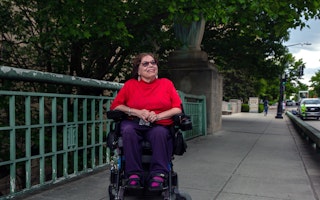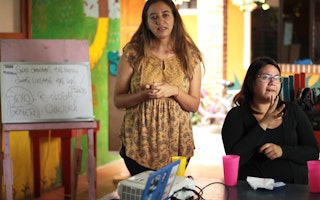For Children with Disabilities, Global Funding for Education Falls Short
By Dragana Sretenov

Across the globe, millions of children with disabilities are missing out on education because not enough money is being budgeted for their needs. At least half of the world’s 65 million school-age children with disabilities are not in primary or lower secondary schools, and a majority of young children at risk of developmental delays and with disabilities are not benefiting from early childhood education.
Children with disabilities are the most marginalized, excluded, and forgotten-about group when it comes to education and life opportunity, particularly in developing countries.
A new report, Costing Equity: The Case for Disability-Responsive Education Financing, highlights the financing issue as impeding the success of the UN’s Sustainable Development Goals, which aim to ensure inclusive and equitable quality education for all by 2030. The research, produced by the International Disability and Development Consortium and Light for the World, and supported in part by the Open Society Foundations, calls on both governments and donors to urgently take action, and recommends inclusive education as the best approach for children with disabilities.
Excluding and segregating learners from mainstream education due to disability, race, language, religion, gender, or poverty constitute discrimination. Despite evidence of the significant benefits of inclusive education, which should start in preschool and span all levels of education, most governments and external donors are not directing enough funding toward this issue.
Too often, small allocations are made for special education, or children with disabilities and other groups of excluded children are forgotten altogether. The report finds a persistent failure to invest in system-wide reform.
Early childhood intervention—for those under three years of age—and inclusive preschool education can keep young children with disabilities out of institutions, reduce gaps in development, and avoid the high costs of segregated education and specialized interventions later in life. Inclusive preschool education also leads to the timely start of primary education, drastically reducing out-of-school populations by removing barriers to learning and participation.
Despite strong evidence on what works in education for children with disabilities, and other groups traditionally segregated from mainstream education, government investment worldwide remains insufficient to support the research, expertise, or teacher training needed to facilitate inclusive education.
Costing Equity shows that even among the world’s leading donor education agencies in places like Japan and the Netherlands, the situation falls far short of the targets laid out in the Sustainable Development Goals. The findings suggest that, despite limited signs of progress in some agencies, progress is very slow at the country level.
The report identifies several reasons for the gap between commitments on paper and programs on the ground, including a lack of dedicated staff, a dearth of transparency on education funds directed to inclusive education, and an absence of a comprehensive approach to disability-inclusive education.
The global decline in funding for education is a huge problem and risks further deprioritizing education for children with disabilities. Another major concern identified in the report is domestic funding, which is perceived as the most important source of education financing. Many governments wrongly believe that the returns on investment in inclusive education will be low despite evidence showing that they are two to three times higher for persons with disabilities than for those without.
Low-income countries in particular need to close the gaps between inclusive education policy and practice. The report calls for a more strategic use of existing resources, reprioritization of budgets, stronger focus on quality measures such as improved teacher education, and strong political and community leadership on inclusion.
Inclusive education is by far the most impactful, cost-effective, and proven way forward. Only when governments, together with the world’s leading donor agencies, begin prioritizing this issue will every child, regardless of ability, have the chance to get the education they deserve.
Dragana Sretenov is a senior team manager with the Open Society Early Childhood Program.


